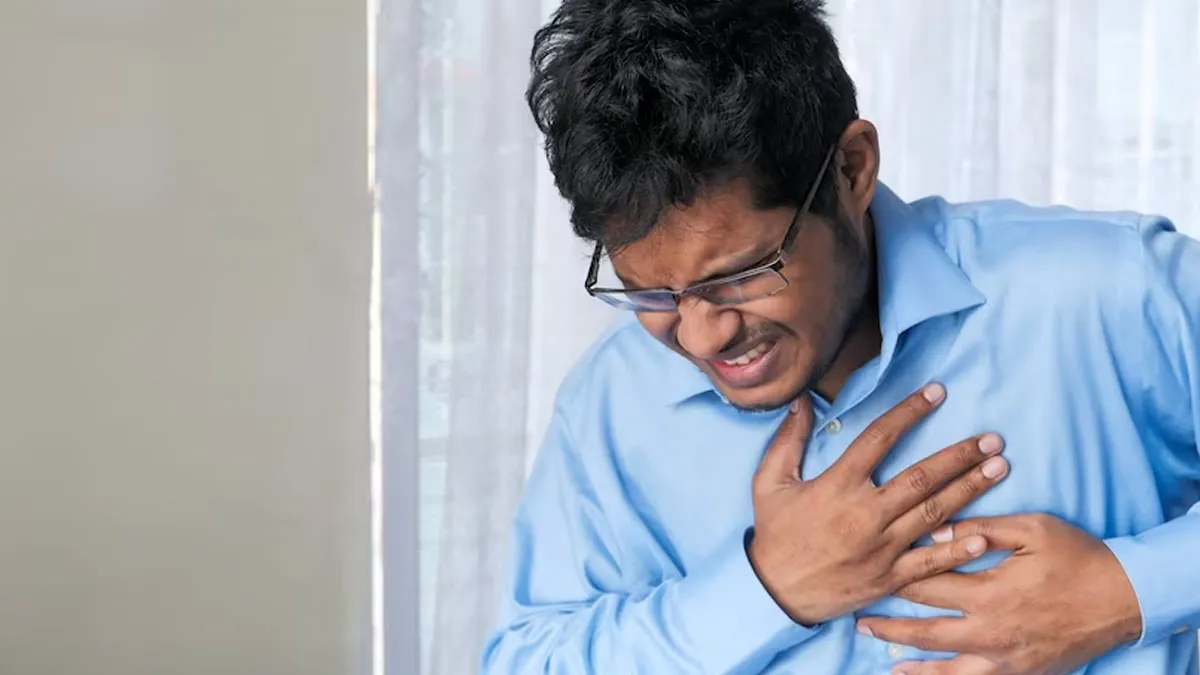
Struggling with that sharp, stabbing pain with every breath? Well, the dull, throbbing pain that gets worse with each inhaled breath can be a cause of real worry. Though our brains tend to leap to the worst possible explanation of a heart attack, the truth is that chest pain with breathing is frequently brought on by a host of lesser life-threatening factors. So what's actually going on in your body, and when do you need to worry?
Table of Content:-
We asked the same question to our expert, Dr Prateek Chaudhary, Senior Consultant - Interventional Cardiology at Asian Hospital, Faridabad, and he explained to us why your chest hurts everytime you breathe. Here’s what he shared with us, and you need to know.
Why Does Your Chest Hurt When You Breathe
Our chest cavity is a complicated area, where important organs such as our heart and lungs reside, along with a network of muscles, nerves, bones, and cartilage. As we inhale, our intercostal muscles (the muscles between the ribs) and diaphragm contract and relax, moving our chest out and getting our lungs filled with air. Any pain that arises from injury, inflammation, or irritation of these structures is a possibility.
According to Dr Chaudhary, here are some of th primary causes of that sore, painful breath:
1. Musculoskeletal Disorders
The most common reason for chest pain with breathing is an issue with the musculoskeletal system. These may include:
- Costochondritis: Inflammation of the cartilage that attaches our ribs to our breastbone (sternum). Sharp and stabbing pain that may be worse on deep breathing, coughing, or sneezing. Often due to a viral infection, injury to the chest, or even heavy exercise.
- Muscle Strain: A pulled or strained intercostal muscle can be incredibly painful. This can happen from vigorous exercise, a sudden twisting motion, or even a prolonged coughing fit. The pain is usually localised and feels tender to the touch.

Also Read: 5 Signs That You Need a Break and How to Recover
2. Respiratory Conditions
The health of our lungs is intrinsically linked to our ability to breathe without pain. If it pains while breathing, chances are of:
- Pleurisy (Pleuritis): An inflammation of the pleura, the thin membranes that cover our lungs and the chest cavity. In a healthy chest, these membranes slide against one another easily, but when inflamed, they rub against one another, generating a sharp, stabbing discomfort with each breath. Pleurisy is a complication in many cases of viral or bacterial infection, such as pneumonia.
- Pneumonia: An infection that inflames the air sacs in one or both lungs, usually filling them with pus or fluid. This may lead to pain in the chest when breathing, accompanied by a cough, fever, and shortness of breath.
- Bronchitis: Although mostly responsible for cough, acute bronchitis can also be responsible for chest pain or a burning sensation due to the frequent irritation of the airways.
3. Other Causes or the Less Obvious Culprits
Dr Chaudhary highlighted that occasionally, the chest pain is a result of a problem elsewhere in the body. Such as:
- Acid Reflux (GERD): Severe heartburn often simulates chest pain when the stomach acid burns the oesophagus. The discomfort is sharp and may also worsen lying down, occasionally being confused with a respiratory-related problem.
- Anxiety and Panic Attacks: Adrenaline rushes during a panic attack may trigger hyperventilation, producing tightness, pain, and a sense of not being able to breathe.

When to Seek Medical Help
Dr Chaudhary noted that although most causes of chest pain are not life-threatening, it is important never to ignore it. In case your chest pain is ever accompanied by any of the symptoms below, get medical help immediately:
- Crushing or squeezing pain in your mid-chest
- Pain radiating to your arms, back, neck, or jaw
- Shortness of breath or trouble breathing
- Dizziness, lightheadedness, or fainting
- Nausea or vomiting
- Cold sweat
These can be a sign of a heart attack or pulmonary embolism (a blood clot in the lung), both of which are emergencies and require professional assistance.
Bottomline
A painful breath is a signal from your body that something is amiss. While it's most often a minor issue, it's essential to listen to these signals and consult with a healthcare professional to get an accurate diagnosis. Understanding the potential causes can alleviate some of the initial fear, but a medical expert is the only one who can truly unlock the mystery and ensure your peace of mind.
Also watch this video
FAQ
Is chest pain while breathing always a heart attack?
No, in all but a very few instances, no. Although heart attacks are a cause for concern, pain in the chest that increases with breathing is actually more typically due to musculoskeletal causes such as costochondritis or respiratory problems such as pleurisy. But because the symptoms can overlap, always get a professional opinion to exclude a cardiac cause.Can stress or anxiety make me have chest pain when I breathe?
Yes, definitely. Severe stress and anxiety can trigger hyperventilation, which brings on chest tightness and severe pain that can be similar to other conditions. This is one of the typical symptoms of panic attacks, where the stress response of the body can create bodily feelings that are extremely threatening.When should I seek out the emergency room for this type of pain?
You should promptly obtain emergency medical attention if your chest pain is joined by other life-threatening symptoms like squeezing or crushing pressure, shortness of breath, dizziness, arm or jaw pain that radiates to these areas, or a cold sweat. These could be symptoms of a heart attack or a pulmonary embolism, which should be treated right away.
How we keep this article up to date:
We work with experts and keep a close eye on the latest in health and wellness. Whenever there is a new research or helpful information, we update our articles with accurate and useful advice.
Current Version
Sep 22, 2025 18:42 IST
Modified By : Tanya SrivastavaSep 22, 2025 18:42 IST
Published By : Tanya Srivastava